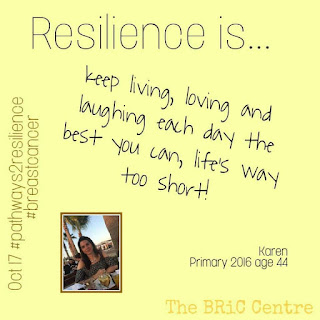"Bouncing Forward with Resilience"
I'm thrilled and delighted to share our October project, #pathways2resilience which highlights and celebrates the different ways women practice resilience in their daily lives.
Every day, we will be sharing some of the many faces of resilience of women with primary and secondary breast cancer, who will be describing in ten words or less, what resilience means to them, with grit, courage, tears, hope and love.
Every day, we will be sharing some of the many faces of resilience of women with primary and secondary breast cancer, who will be describing in ten words or less, what resilience means to them, with grit, courage, tears, hope and love.
As a Professor of Experimental Psychopathology and cognitive neuroscientist, specialising in the neurocognitive mechanisms behind anxiety, depressive vulnerability and resilience at Birkbeck University of London, when I was diagnosed with breast cancer myself, I became determined to use my experience to help women overcome the psychological impact of breast cancer.
Recent research describes resilience in terms of elasticity, and flexibility, the ability by which we can adapt in the face of hardship. Neuroscience has discovered that the brain is plastic and so it can be trained to become resilient. It can learn to become resilient. Neural connections can be strengthened and new pathways can be formed to place us firmly on the road to resilience. Importantly resilience is a dynamic process so its precise measurement should involve the trajectory of time.
I founded the The BRiC Centre less than two years ago with this mission in mind: To build building blocks of resilience in women with breast cancer. Women who are mothers, wives, partners, and sisters. Women who are teachers, doctors, and hold many responsible posts in society. Women who are left highly vulnerable after diagnosis, a vulnerability that impairs emotional and cognitive health increasing anxiety and depression as well as PTSD for years post diagnosis. Women whose fear of recurrence constitutes a major vulnerability interfering with daily life, reducing cognitive efficiency. These women are keen to improve their well-being and to live meaningful lives.
We have more than 3000 followers so far and our private educational support group has more than 1060 UK members. I'm so proud of my two deputies Vicky and Tamsin as well as our amazing ambassadors, Anita, Caroline, Jan and Jenny. Importantly, the stories of these women show how resilience is helping them bounce forward in life.
Follow our October project: #pathways2resilience to hear them.
"Making every day a good day, living for the moment."
As #BreastCancerAwarenessMonth comes to an end, we are reflecting back on the extraordinarily rich and varied ways that the 64 women who featured in our #pathways2resilience project practice their resilience. These incredible women, living with primary and secondary breast cancer, are the 1 in 8 women who hear at some point in their lives that they have breast cancer.
We are the real women behind the statistics. We are not 'patients,' we are mothers, daughters, sisters, partners and friends. We are all women everywhere.
We leave the final words for Rachel, an icon of resilience. #pathways2resilience #BreastCancerAwarenessMonth
































































